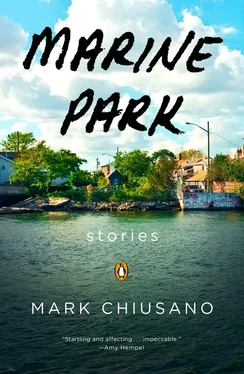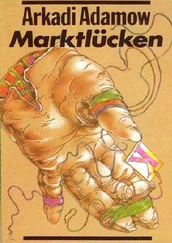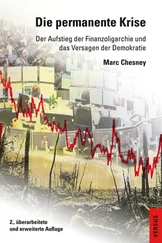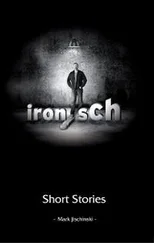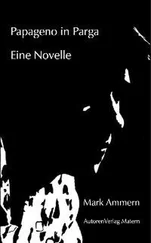Where could he go? He could go to the house where he grew up, watch the light die with his parents. He could park on their block, walk in, ring the bell, and watch their surprised faces. Talk to them about the future. He did not. He went off R to Fillmore, to the edge of the park, the Marine Park basketball courts, spread out on the corner of the green.
Just before he got to the chain-link, someone yelled from behind him. Hey, the voice said. Andrew turned. It was Ed Monahan. Hey, Ed said again. What’s the idea? You following me around or something? Up this close Ed looked more haggard than he used to. He looked smaller than Andrew remembered, though his arms were taut. What’re you doing back here anyway? I heard you were a city man now. Ed was just below Andrew’s face. His forearms, hairy and muscular, twitched.
Listen Ed, Andrew started, but he couldn’t finish it. He wanted nothing more than a game of basketball. A good one-on-one game, the feel of a body hitting another body, bouncing off, hitting again. Something he hadn’t felt in a while.
Listen, he said vaguely.
You listen, said Ed. Get back in your car, pussy, and get away.
So Andrew hit him. He couldn’t remember the last time he’d thrown a punch. His hand, as it connected with the bones in Ed’s face, broke — or that’s what it felt like. The knuckles moved up, higher than his fingers, though that didn’t make physical sense. Ed staggered back, and then he was on him.
Andrew found himself on the pavement, his face getting hit from side to side. He had that anxious feeling of first blood, the adrenaline jumping through the veins to tell the body, all is fine. A few minutes later it wouldn’t feel that way anymore, and it would just be pain, until someone pulled Ed away, with flashing lights. On the pavement, Andrew imagined many things. He imagined that it was a basketball fight he’d gotten into, a righteous one; that someone had called a hard foul and he was upholding the call, and then the perpetrator attacked. He imagined that his face, black and blue and purple the next morning probably, would look like a bouquet of flowers, cherry red with dried blood and green the stems for all the infected parts. And he imagined that Ed Monahan, on top of him until he was pulled off, was having a harder time than he might have, because he had no grip on Andrew’s head, his newly cut hair not long enough to hold on to. Andrew felt thankful for his haircut, for the cool breeze he felt passing by his neck.
Way down south and east and close to the water, where Avenue U runs parallel to the salt marsh, and the sounds of the trucks heading toward the Belt Parkway keep sane people up at night, in a house that used to belong to his parents lives Ed Monahan. Some nights Ed stays up shivering, thinking of all the ills that befall this country. Sometimes while he watches the news he thinks of ways things could be better. He owns a gun, the same one his daddy did, his daddy who was a police detective, and worked as a court officer once he retired. One day in the court Ed Monahan’s father worked in, a man made it around the metal detectors that the technicians were just installing, back before they were mandatory, and in the middle of the grand jury proceedings the man, who had been brought in to be a witness, stood up and fired three shots at the defendant on the stand. Two missed. Ed Monahan’s father, who had been seated at the front with his arms crossed, keeping his eye on the defendant, who in his opinion looked “shifty,” took one step forward and raised his gun. With one bullet, he downed the shooter. It was a true shot, but the shooter survived, and went on trial and got fifteen years prison. It was the first time Ed Monahan’s father had fired his gun. Niggers, he said.
In the morning, Ed Monahan, who had never successfully held down a full-time job, gathered his belongings and his merchandise and packed them onto his bicycle, in wide burlap motorcycle packs he’d bought from the army surplus store on Atlantic Avenue. He put in all the string shaving cream, fire snaps, boxes of hard candy that wouldn’t melt, and toy BB guns that made clicks when you pressed the trigger down rapidly. He had a ponytail that he washed every morning. He had a girlfriend who some nights slept over, who would take her clothes off and lie naked beside him, while he struggled to get himself prepared — though this morning she was not. He had black T-shirts that he wore every day with his jeans. When he had his T-shirt on, over the wifebeater, gray from hand-washing and age, that he wore even in the summer, he wheeled his packed bicycle out of the house and toward the open street by Avenue U. Summers, he had a job to do. He was saving up to buy a car. He got up early. He felt good about himself. He got on his bike and rode the couple of blocks toward the playground in Marine Park.
• • •
Basketball was the only thing he’d ever enjoyed. Nobody else really understood it, or understood what it meant to him. His father hadn’t — had only wanted him to get taller and stronger and faster, fast enough to beat the black kids in CYO ball, when Ed Monahan played for Good Shepherd. For a while, he was — tall and strong and fast enough. But some things don’t stay like that forever, and his growth spurt ended at fifteen. He held on for a couple years, even walking onto a team in college. But a kid from the projects got the point guard job instead of him, and he quit after the first year. My kid doesn’t ride pine, Ed Monahan’s father said proudly. Now Ed only watched the Knicks at the Mariners Inn, every once in a while. He hated, with an intensity, the people who were diehard fans and wouldn’t miss a game.
This was the Mariners Inn that Ed Monahan biked slowly by, where the firemen, retired or on disability, stood outside to have a smoke. Morning, Ed, one of them said, as Ed passed. Ed nodded back, and his thin ponytail bounced up and down. Almost out of earshot, the retired fireman said, Fag, and put out his cigarette and went inside. Ed Monahan kept biking.
At the playground, Ed made an exploratory circle on his bicycle. It was the type of day where everybody was around the sprinkler in the middle, kids and adults. Some of the adults were parents — firemen or cops on their off hours, office workers on vacation. There were grandmothers and grandfathers, still trim in polo shirts tucked into their shorts. They looked like they could outrun Ed, still. Ed hadn’t kept his speed up, though he was still trim. He blamed it on the cigarettes. Because Ed hadn’t played football as a kid, even though he was an absolute wizard at basketball, the rest of the neighborhood youth disowned him. His nickname was Pussy Ed, all the way up to seventh grade. Even when he led Good Shepherd to the St. Francis de Sale’s Christmas Tournament title — but some things can’t be overcome.
When he guided his weighed-down bike into the confines of the playground, the grandparents edged a little closer to their grandkids. The parents, some of whom knew Ed, left it alone. Ed pulled in a deep breath, and while doing so he felt that the whole park was holding its breath around him. He yelled: Crackers! Candy! String cream! Under a dollar! The parents looked down at their feet. The children, their heads turning away from the water, came running.
In Ed’s business you make your money in dimes and quarters; there’s nothing wrong with that. He had blisters on his fingers from the coin roll-ups he was constantly using, to put the money together to bring to the bank. He didn’t spend much — he had the house from his daddy. In the winter he worked as an ice guard at the Aviator rink. The coins added up. While the children walked or jogged to him, he heard their coins’ metallic bounce in his mind’s ear.
Читать дальше
